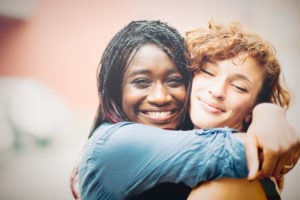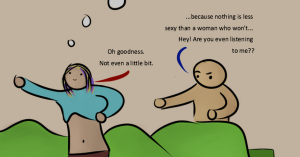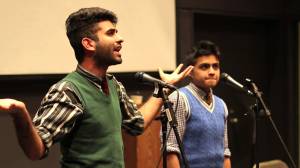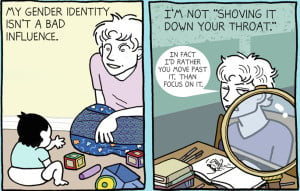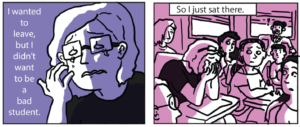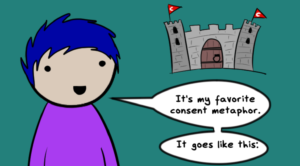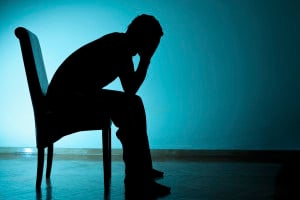This may come as a shock – because if you’re like me, you might like to think of social change activists as enlightened beings. But the truth is that sometimes, even those of us in social change movements participate in oppressive behavior.
Okay, so maybe that’s not such a shock, because if you’re like me, you’ve also come across oppression even among activists working to create a just world.
And lately, there’s been a lot of talk about which tools we should use to address oppressive behavior in our communities – and two options people have come up with are calling out and calling in.
Calling out is bringing public attention to an individual’s oppressive behavior – and it can be an effective approach to community accountability. But calling out also has its drawbacks. And that’s why calling in – addressing someone’s behavior more privately and personally – has come up as an alternative (and sometimes argued, more effective) approach.
But is it really as simple as deciding that calling out is bad, and calling in is good?
I wish. That would make it a lot easier to figure out how to deal with these situations. But one thing I’ve learned in activist work is that nothing works in simple binaries of “good” and “bad.”
And because it’s important for us to honor the complexities of the full truth, let’s dive deeper into what it means to call someone out or in.
To help you figure out how the tools of calling out or calling in can be used most effectively in your life, here are some thoughts to consider.
1. Make Sure the Response Is Survivor-Centered
I use the term “survivor” here because this approach is based on principles for supporting survivors of violence. It’s appropriate for instances in which the oppressive behavior is abusive, but in all cases, the general principle of supporting the person or people who are harmed can be an effective way to frame our approach.
What would it mean to center the person who is harmed when we address oppressive behavior in the movement?
It means treating them with respect, above all things. That includes respecting their wishes, trusting them to make their own choices about what’s best for them, and putting their needs first.
Which means we should never pressure a survivor to call someone in or out – and pressure tends to show up when we think we know better than someone else what’s best for them (we don’t).
One of the problems with urging people to call the ones who’ve harmed them in, instead of out, is that it risks invalidating the survivor’s feelings – which should be of the utmost importance. Instead of honoring the survivor’s need to heal and make their own choices about how best to do that, we might put the abuser’s feelings first.
Compassion is a valuable asset to our movement work, but if we focus more on encouraging survivors to be compassionate than on the survivors’ feelings, we can sound a lot like those toxic messages that socialize many of us to take care of others before ourselves.
I, for one, can be prone to internalizing the self-destructive nature of those messages.
As a woman, I’ve been taught by the mainstream media that my role is to put other people’s needs, wishes, and desires before my own. As a survivor of intimate partner violence, I’m still unlearning the tendency to distrust my own feelings and do whatever those around me want me to do.
Consider who you’re silencing when you encourage people not to speak up and call out the people who’ve harmed them. I already face many obstacles, like the angry Black woman stereotype, that invalidate my right to express my feelings.
So for my healing, it’s important for me to be empowered to take care of my own needs first. If someone causes me harm, the last thing I need is for someone else in my community to step in and urge me to take care of that person’s feelings or ask me to share space with them.
There are many valid reasons why you may not want to call in a person who’s been oppressive towards you. For example, you may not feel safe approaching the person on a personal level. You might also be facing the challenge of the implicit or explicit power dynamics between you and that person.
After all, oppressive behavior works through a top-down system – so the conditions that allow it to happen give the person causing harm more power than the person who’s harmed.
For instance, a white person at a justice organization who commits a racial microaggression against a colleague of color is in a position to perpetuate the marginalization of their colleague.
Other factors – such as a hierarchy of positions in the organization, a person’s popularity in the movement, and additional differences between identities – can further contribute to an imbalance of power.
So the expectation for someone to approach a person who has abused power over them and get their needs as a survivor met is unrealistic, and it contributes to a culture of dismissing a survivor’s needs.
As sociopolitical critic Zahira Kelly, aka The Bad Dominicana, tweeted, the ability to call in “depends on how much weight your word carries.”
That’s bad news for marginalized people who’ve been harmed.
And who’s to say that calling out can’t be compassionate? If it’s done with healing in mind, calling out can show compassion to the survivor, the abuser, and the community around those who are directly involved.
Ultimately, it would be most compassionate to avoid declaring that there’s any one course of action that would always work. That ignores the complexities beyond the either/or thinking that calling in or calling out is always the answer, as well as the survivor’s individual needs.
Instead, let’s support the person harmed by oppressive behavior through a survivor-centered approach.
2. Find the Appropriate Balance Between Addressing This As an Individual Problem and As a Systematic One
While the people directly harmed by oppressive behavior are the most important to consider, it’s also true that interpersonal moments of oppression are connected to the systematic conditions that allow them to take place.
For example, a person excluding trans women from queer spaces is operating under the unjust logic of a whole system of transmisogyny and homonormativity.
A guy who mansplains his way into dominating conversations might be following the example of every man in his life who conforms to patriarchal expectations.
So the urge to draw the connections between what’s happening in our communities and the intersecting systems that cultivate oppressive behavior as the norm is a very valid one.
Calling out can be a great opportunity to do just that.
As a community dedicated to anti-oppressive work, we can stand up to publicly identify the behavior we want to change and shift toward the culture we’re striving for instead.
Calling in can fall short in addressing the instance as a one-time mistake, rather than one part of a bigger picture. You could have one individual telling someone “This is how you hurt me,” or there could be a strong chorus of voices saying “This is how this behavior hurts all of us.”
It’s also true that we humans are multi-faceted beings, and the way we participate in oppression is not the whole of who we are. Another way to fall short is by seeing a person who’s caused harm as nothing more than a representation of the oppression they’ve perpetuated.
Everybody deserves to be recognized as human. And we can do that by leaving room for the very human quality of being capable of making mistakes.
In “Calling IN: A Less Disposable Way of Holding Each Other Accountable” on Black Girl Dangerous, Ngọc Loan Trần writes, “I picture ‘calling in’ as a practice of pulling folks back in who have strayed from us.”
Their approach calls for radical love for one another. Although the people in our communities are capable of causing harm, the good news is that we don’t have to lose each other when we stray.
So find the balance that’s right for you.
If someone has been abusive, or the survivor and community would be safer without their presence, the collective love rallied together for a call-out can help the necessary healing take place.
And if it’s appropriate to extend some love to a person who made a mistake, to help them grow and do better, then a call-in might be the best course of action.
3. Consider the Desired Result
If your approach to oppressive behavior is survivor-centered, the result should be grounded in supporting the needs and decisions of the person who was harmed. And, if it makes sense, there can also be other factors to consider.
To pursue the ideal outcome, you may want to think about some of the following questions:
- What does the person harmed need?
- Are there other community members (such as bystanders or members of the same marginalized group) who have been impacted? What do they need?
- In what ways does the culture of this community support this behavior?
- Does the person harmed feel safe in community with the person who caused harm?
- Is the person who harmed willing to learn and change their behavior?
You can see how these questions like these can help shape a unique course of action.
For example, a call-in might help educate an organizer whose plan of action excluded her disabled comrades – but what if her behavior is supported by a whole organizational culture of using ableist language? A call-out could help address ableism on a structural level.
Or a call-out might be a useful way to show collective support for a woman harmed by sexist behavior – but what if the man responsible for this behavior genuinely doesn’t know what he did wrong and would be concerned about it if he did? A call-in could be an opportunity for him to learn and change, creating a safer environment for the woman he harmed and all people in the community affected by sexism.
Just as we as activists are well aware of the dangers of oppressive behavior, many of us are also aware that the crime and punishment model of the prison system is harmful, not helpful, in achieving true justice.
So if our own approaches to accountability replicate that same crime and punishment model, we’re likely to end up with similar results – shame, isolation, and retraumatization – rather than healing.
Much of the critique of call-out culture has rightly pointed out that naming a person and presenting their behavior to the public can feel a lot like and indicting and judging them by a “jury of peers.” And treating people as disposable with a determination of who’s “in” or “out” of our movements can feel like the isolation and punishment that has proven to be hurtful and unhelpful in achieving a true vision of justice and rehabilitation.
In “A Note on Call-Out Culture,” Asam Ahmad wrote that it can feel like the public performance of a call-out “is more significant than the content of the call-out.”
By calling in, we can go beyond that, to really help a person understand their mistake and change their behavior – a worthwhile result.
At the same time, we are talking about oppressive behavior, which is part of some really deep and complex issues that impact our lives in a major way. There’s no way to downplay the significance of that, even if it’s just a simple mistake with good intentions.
And sometimes, we’re talking about downright abusive behavior, and/or people who are causing harm and are unwilling to take responsibility for their actions and change. In that case, we shouldn’t expect anyone, least of all the survivor they’ve harmed, to take on educating that person and trying to help them grow.
Remember what we’re building together with our anti-oppression work – empowerment, rather than victim-blaming, and accountability, rather than shame and punishment.
***
So there’s a lot to think about.
Figuring out whether to call in or out can be complicated, but as agents of social change, we already have the ability to survey complex situations and shift course from oppression to love and liberation.
By calling someone in or out, we challenge the shortsighted idea that “we’re doing the best we can.”
We hold ourselves and each other to a higher standard of knowing that we can actually do better. Not because we’re supposed to be perfect, or we’re doing a terrible job, but because we can always strive to do better, to grow more into the fullness of what a creating just world truly means.
We don’t need oppression in our world, and we sure don’t need it in our movements and organizations.
Now, we have both calling in and calling out in our toolboxes, and we can sharpen these tools and start with our own communities to eradicate oppression.
[do_widget id=”text-101″]
Maisha Z. Johnson is the Digital Content Associate and Staff Writer of Everyday Feminism. You can find her writing at the intersections and shamelessly indulging in her obsession with pop culture around the web. Maisha’s past work includes Community United Against Violence (CUAV), the nation’s oldest LGBTQ anti-violence organization, and Fired Up!, a program of California Coalition for Women Prisoners. Through her own project, Inkblot Arts, Maisha taps into the creative arts and digital media to amplify the voices of those often silenced. Like her on Facebook or follow her on Twitter @mzjwords.
Search our 3000+ articles!
Read our articles about:
Our online racial justice training
Used by hundreds of universities, non-profits, and businesses.
Click to learn more






